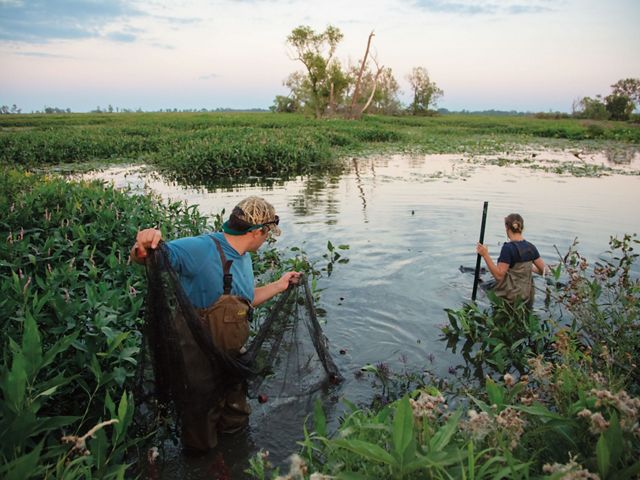A Plan to Limit Flooding in N.J. Is Hampered by Evaporating Federal Funds
In the Marlton neighborhood of Camden, N.J., flooding is constant and costly. A new plan promises to use nature to help residents—if only federal funds were easier to come by.
The actions that policy leaders in the United States take this decade will significantly influence our ability to care for nature and create clean energy.
The decade got off to a great start. We saw the passage of the federal Great American Outdoors Act, Infrastructure Investment and Jobs Act and Inflation Reduction Act, in addition to dozens of state ballot initiatives that, collectively, provide hundreds of billions of dollars in investments and tax incentives to protect people and the planet.
But many of these and other important policies—as well as the funding, staff and services that comes with them—are being weakened or eliminated.
TNC is meeting this moment by defending government policies related to nature and clean energy. When these types of policies are implemented and funding related to them is allocated, the return on the government’s investment is significant, according to a new TNC report. More jobs and outdoor recreation opportunities are created, the water we drink is clean and costs related to natural disasters are lowered. These benefits are fundamental to the American way of life. Now is not the time to weaken policies or cut funding related to nature and clean energy.
Take Action Now
Congress is working on allocating federal funding. Join us and urge Congress to preserve conservation and climate funding that helps create a future where people and nature thrive.


For decades, The Nature Conservancy has worked with elected officials and agency experts to create, implement and defend policies and programs that protect people and nature. Our approach to policy is grounded in being nonpartisan, science-based and open to diverse viewpoints; engaging with communities; staying true to our values and leveraging our extensive networks.
We cannot achieve our goals without a variety of partners, such as people in the private sector, academia and nonprofit organizations. Government experts, particularly at the federal level, are especially important to work with, given that they can help fund and provide the technical expertise to scale our work. Federal experts and funding are also critical for states, many of which rely on these resources to do their own work.
Federal funding is already being used to accelerate clean energy projects in Kentucky, support stream restoration projects in Maine and plant more trees in Pennsylvania.
These are the kinds of programs and projects we need to create a more livable world. The American people recognize the value of these investments, with 77% of voters saying that, even with federal budget challenges, funding to safeguard our lands, air and water should not be cut. The government and lawmakers must stand on the side of the American people and the park rangers, scientists, firefighters and so many others who make this work a reality.
The Nature Conservancy urges Congress to:
Recent legislation, including the Inflation Reduction Act, provided significant funding for clean energy and conservation projects that benefitted people, communities and nature.
In the past few years, Congress took action to advance clean energy, conservation and climate resilience through legislation, including the Infrastructure Investment and Jobs Act.
The Farm Bill is the largest source of federal funding for conserving, restoring and managing private land in the U.S. It provides voluntary programs that help farmers, ranchers and forest landowners address climate change.
Click on a photo below to learn about the projects.
Speak Up for Nature
We need to protect critical conservation funding at the state and federal levels because we know that we have years—not decades—to address the intertwined crises of climate change and biodiversity loss facing the planet.

Sign up to receive monthly news and policy updates from The Nature Conservancy.